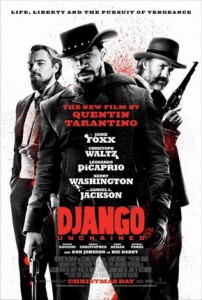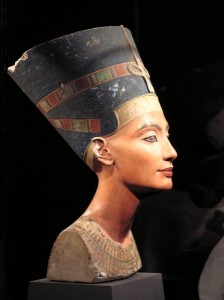Django Unchained:
Another Jewish Wet Dream
By Trevor Lynch

German translation here
Quentin Tarantino’s last movie, Inglourious Basterds (2007), tells the story of a group of American Jews who team up with a non-white (an Amerindian-white mix from Tennessee with an Italian name, like Tarantino himself), to torture, mutilate, and slaughter evil white men and women (Germans, Nazis) during World War II. ‘Terds, in short, is nothing but an elaborate fantasy of Jewish sadism and revenge. Tarantino’s producer, Lawrence Bender, told him, “As your producing partner, I thank you, and as a member of the Jewish tribe, I thank you, motherfucker, because this movie is a fucking Jewish wet dream.” Lovely people.
Tarantino’s latest movie, Django Unchained (2012) tells the story of a black former slave, Django (Jamie Foxx), who is trained as a bounty hunter by an itinerant German dentist, Dr. Schultz (Christoph Waltz). Django and Schultz then try to locate and buy Django’s wife Broomhilda (sic). Once Broomhilda is discovered, Django goes on to slaughter countless evil whites: slave owners, their sisters, toothless inbred redneck morons, slave traders, and the horses they rode in on — apparently with exploding bullets, given the geysers of blood, severed limbs, and flying entrails that, aside from inducing nausea and nervous laughter, give the film a tiresome, farcical feel.
Chattel slavery was an evil institution inflicted upon black slaves and free whites alike by America’s small, sociopathic capitalist class, which included such revered “Founding Fathers” as Presidents Washington and Jefferson, who, to advance the economic interests of their class, used a lot of high-flown twaddle about rights, freedom, and equality to get the rabble to fight and die in a war of secession from England.
When America was founded, it was an overwhelmingly racially and culturally homogeneous country, but it was never really an organic community in which social inequalities had to justify themselves by serving the common good. Instead, it was a liberal society in which individuals, who possess “rights” that trump considerations of the common good, sought to enrich themselves by means that a decent society would not have permitted, including slavery.
Ideally, America would have been a classical republican society with a broad middle class of self-employed farmers, tradesmen, craftsmen, and merchants. To prevent the loss of freedom that comes when a few wealthy men end up employing masses of poor men, enterprising individuals would have been kept in check, so that there would be few employers and few employees. Capitalism and inequality would, in short, have been subordinated to the common good.
The second best option would have been the regulation of capitalism by a strong political alliance of independent smallholders and organized labor, with the aim of creating a genuinely organic republic. (The labor movement, in my opinion, is the one truly heroic chapter in American history.) Under such a system, slavery would have been abolished peacefully and bloodlessly, with compensation, as it was virtually everywhere else, and all blacks would have been repatriated to Africa to enhance the racial and cultural homogeneity that are the greatest blessings and strengths of any society. Large plantations would have been split up into small, independent farms. The people from the big houses would have learned to pick their own damn cotton.
It would be wonderful to have a movie that dramatizes the true evils of slavery, and of capitalism more broadly, from a pro-worker, pro-smallholder point of view. But Django Unchained is not that movie. The truth about slavery was evil enough. One does not need to exaggerate or tell lies about it. But this movie is filled with ludicrous lies and just plain indifference to the truth.
A title card informs us that the movie is set in 1858, “two years before the Civil War.” The Civil War, of course, began in 1861.
In one scene, we see masked vigilantes on horseback, presumably the Ku Klux Klan, which was not founded until 1865.
When Dr. Schultz learns that Django’s wife is named Broomhilda, he tells the story of Siegfried and Brünnhilde, incorporating elements of Wagner’s Der Ring des Nibelungen, the libretto of which had been written in 1852 but circulated only among Wagner’s friends. The two operas from which Dr. Schultz was borrowing, Die Walküre and Siegfried, premiered in 1870 in 1876 respectively.

At one point, we are ushered into the Cleopatra Club, a lavish brothel full of black whores. (It seems odd that white men would prefer black whores when white whores were plentiful.) The historical Cleopatra, the seventh of her name, may have been a bit of a whore, but she was a Macedonian Greek, not a black.
The Cleopatra Club is decorated with busts of Queen Nefertiti, who lived 1,300 years before Cleopatra, and who was not black either. The particular bust that is reproduced, which is in the Ägyptisches Museum, Berlin, was unearthed in Tel-el-Amarna in 1912.
But why be pedantic, given that this movie is created by a consummate cynic for an audience of morons?
In one of the salons of the Cleopatra Club, its owner Calvin Candie (Leonardo DiCaprio) is overseeing a “Mandingo fight” between two strong blacks. The fight does not take place in a ring, but just at one end of a room, surrounded by the chairs of spectators — an absurd, impractical, and unsafe arrangement, given that these men are fighting to the death. (There is no evidence that slave owners ever had such gladiatorial contests, by the way.)
After a lot of grunting and some eye-gouging, Candie orders the victorious slave to dispatch his opponent with a claw hammer. Later Candie orders a runaway slave torn to pieces by dogs. Yes, this is a disgustingly sadistic movie: the Marquis de Sade meets Uncle Tom’s Cabin (a characterization I was saving for Mandingo [1975], which now seems like a Jane Austen adaptation by comparison).
The message of this movie to blacks is that white people are loathsome sadists and morons who should be killed with utmost brutality and dispatch. Louis Farrakhan described the movie as “preparation for race war.” White people have died because of this movie, just as white people have died because of the lies Anderson Cooper and other people in the media told about George Zimmerman and Trayvon Martin. Thus we should count ourselves fortunate that Django Unchained is so long and boring (at 2 hours and 45 minutes) that it puts insuperable demands on the average black attention span. (At least we’ll know for sure next summer, if babies start turning up with names like Broomhilde and Phrenology.)
If Tarantino had merely wanted to whip up blacks into a murderous rage against whites, he would have made a very different movie. But Tarantino had quite another audience in mind. Tarantino wants an Oscar. He wants it bad. Thus Django Unchained is another Jewish wet dream. This is a movie calculated to appeal to Jewish hatred of white Americans. Specifically, Django Unchained is about the Jewish strategy of using blacks as biological weapons of mass destruction against whites. (Released on Christmas Day, so Jews could see it either before or after dinner at a Chinese restaurant.)
The key to the filmmaker’s intent is that Christoph Waltz plays the character of Django’s partner, Dr. Schultz, as Jewish.
When Dr. Schultz first appears, he is driving a little peddler’s wagon with a large, spring-mounted model of a tooth bobbing drolly on top. He is an itinerant dentist with a foreign accent. He is physically small and nonthreatening, with a shambling gait, and his arms and hands held close to his body. He is a real talker though, with a smooth patter and large vocabulary that the stupid, taciturn goyim find off-putting. But appearances are deceptive, because Dr. Schultz is actually a cold, calculating killer who employs complex subterfuges and a gun up his sleeve to get his way. He is a bounty-hunter, who prefers to bring them in dead. He likens his work to the slave trade: human flesh for cold, hard cash. But his wares can’t run away.
Hateful fantasies about teaming up with blacks to harm whites are staples of the Jewish imagination. During the 2008 US presidential campaign, Sandra Bernhard warned Sarah Palin to stay away from the Jewish stronghold of New York City lest she be “gang-raped by my big black brothers”
During the 2012 US presidential campaign, Bill Maher warned whites not to vote for Mitt Romney because “Black people know who you are, and they will come after you”
But the black-Jewish alliance against whites goes far beyond the fantasies of psychopaths with media megaphones. It is an integral part of the Jewish community’s strategy for advancing its collective interests in America.
As our own Andrew Hamilton ably sums up, before the Civil War, Jews were overrepresented among the people who created and benefited from Negro slavery. Furthermore, they played almost no role in abolishing it. However, as Kevin MacDonald exhaustively documents, after the immigration of millions of East European Jews at the end of the 19th century, Jews began to regard black civil rights as a way that they could increase their own communal power by eroding the power of the white majority. Thus Jews have taken the lead in promoting black political emancipation, social mobility, and cultural visibility — all at the expense of the white majority.
It is, of course, impossible for the director of Pulp Fiction to create 2 hours and 45 minutes of film that are completely devoid of charm, although Django Unchained is Tarantino’s worst effort. My favorite parts are Fritz the horse, the Spaghetti Western music, and Samuel L. Jackson’s performance of Calvin Candie’s loathsome and obsequious head house nigger Stephen.
Stephen enjoys great familiarity with and influence over Massa Candie. In front of others, he is the Massa’s faithful echo: “Yassa, dass right.” But in private he pours himself the Massa’s cognac and tells him what’s what. Yet he is so jealous of his status as head nigger that he never considers doing anything for the good of his people. Indeed, he is more zealous about degrading his fellow blacks than Candie himself, who is a proven sadist.
Jackson is a brilliant actor. All he needed to bring this role alive was five minutes watching Tarantino interacting with Harvey Weinstein.
No comments:
Post a Comment